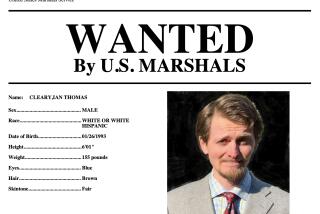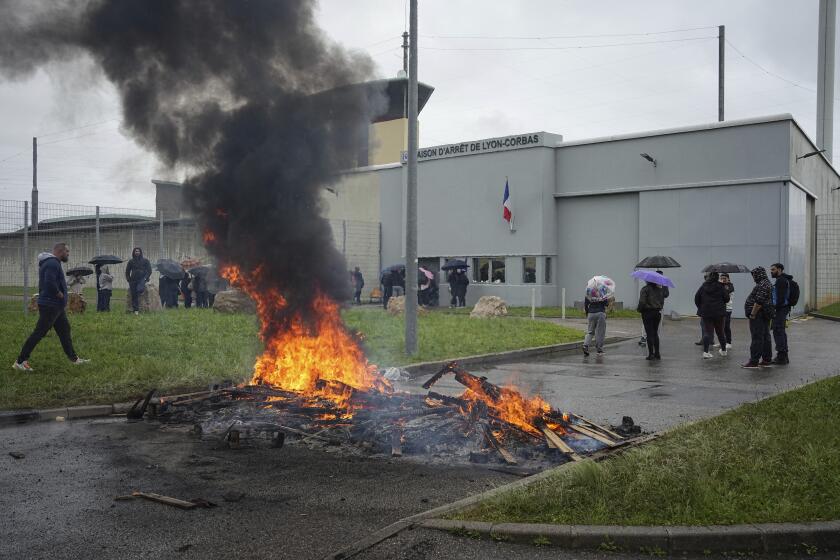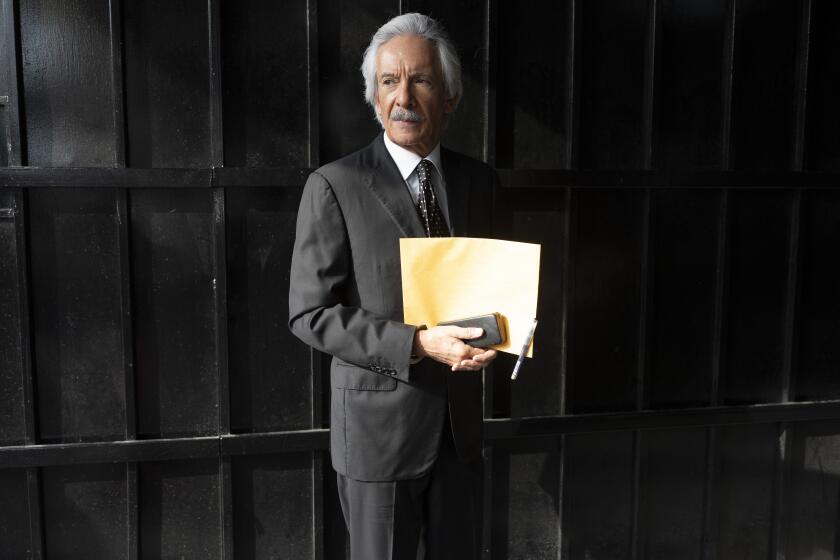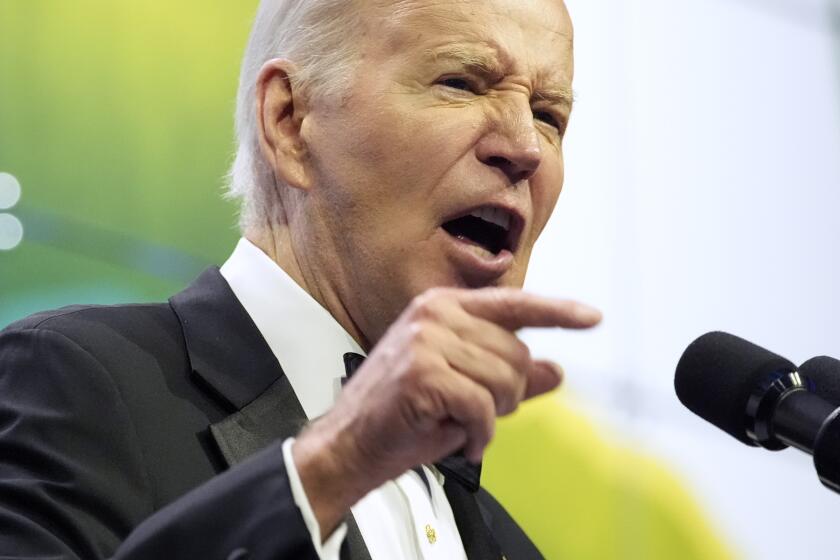Lives Hold Stories of Loyalty, Generosity, Love and Courage
Chris Klein-Beekman was a jovial Canadian who planned to settle in Iraq. Sahir Khuhir Salim was a somber, love-struck Iraqi desperate to get out of the country.
Just before 4:30 p.m. Tuesday, Klein-Beekman, 32, program coordinator of UNICEF’s Iraq operations, walked into the U.N. headquarters for an appointment. Salim, 31, was parked in front of the building, the former Canal Hotel, waiting to give a neighbor a lift.
A moment later, an explosives-laden truck blew a massive hole in the side of the building, killing Klein-Beekman, Salim and 18 others.
On Wednesday, their friends and neighbors struggled to make sense of the violent deaths.
“Chris was everybody’s friend,” said Geoffrey Keele, communications officer for UNICEF’s Iraq office who had worked with Klein-Beekman for the last year. “He was the backbone of the organization.”
In a Christian suburb south of downtown Baghdad, Salim’s family lamented that he never achieved his dream of moving to the United States to marry the girl he loved. “He just wanted to get out of Iraq and start a new life,” said Hiba Hani, his sister-in-law.
U.N. officials released a partial list of casualties, including Sergio Vieira de Mello of Brazil, special representative to Iraq; Richard Hooper of the U.S., Arab expert in the U.N. Department of Political Affairs; Ranillo Buenaventura of the Philippines and Martha Teas of the U.S., both of the U.N. Office for the Coordination of Humanitarian Affairs; and Jean-Selim Kanaan and Nadia Younes of Egypt, Fiona Watson of Britain and Marilyn Manuel of the Philippines, all members of Vieira de Mello’s staff.
Among the non-U.N. victims were Gillian M. Clark, a Canadian, working for the Christian Children’s Fund of America and Arthur C. Helton, director of peace and conflict studies at the Council on Foreign Relations.
Each had a story.
*
Arthur Helton was in a meeting, probably with Vieira de Mello, when the bomb went off. An expert on forced displacement, the 54-year-old Helton was in Baghdad to help assess humanitarian issues.
A native of St. Louis, Helton graduated from Columbia College and from the New York University Law School. From the early 1980s, he directed the Refugee Project at the Lawyers Committee for Human Rights. In 1994, he founded and then directed the Forced Migration Project at the Open Society Institute. He joined the staff of the Council on Foreign Relations in 1999.
“Arthur was one of our most respected senior fellows and a noted expert on refugee and humanitarian issues and international law,” Richard Haass, the president of the Council on Foreign Relations, said in a statement posted on the think tank’s Web site. “He had devoted much of his life to improving the lives of others.... The world has lost a devoted and talented champion of the rights of the dispossessed.”
Helton wrote a number of scholarly papers on humanitarian issues and contributed to several books. His 2002 book, “The Price of Indifference: Refugees and Humanitarian Action in the New Century,” analyzed refugee policy in the 1990s.
Helton is survived by his wife, Jacqueline D. Gilbert of New York City.
*
Vieira de Mello inspired great loyalty among the people who worked for and with him in the world’s hot spots. Among those who died with him, many had come to Iraq because Vieira de Mello asked them.
Richard Hooper, 40, an expert on the Arab world on special assignment in Iraq, was from Walnut Creek, Calif. Fluent in Arabic, he had spent most of his life working on issues in the Middle East and joined the U.N. in 1990 to work with Palestinian refugees in the Gaza Strip.
“He had a better sense of the politics of the situation in the Middle East than anyone out there,” said Michele Griffin, a friend and colleague in the Department of Political Affairs. “We relied on him heavily. He leaves a very big hole.
“He was itching to get out in the field,” Griffin said. “His most recent holiday was in Yemen, and his next one was planned for Gaza. That’s the kind of person he was, taking vacations in the places you’d have to pay most people to go to.”
*
Nadia Younes, 57, Vieira de Mello’s chief of staff, was also believed to have been in his office when the bomb went off. A year ago, she left New York to take over media operations for the World Health Organization in Geneva before going to Iraq several months ago.
Younes had a deep tan, a deep, gravelly voice from years of chain-smoking, and a deep dedication to the U.N. “She was so much fun,” said U.N. spokesman Fred Eckhard. “After a long day, she would break out the wine. There was a party in the office almost every night, and she was the spark,” he said, smiling softly at the memory.
*
Ranillo Buenaventura, 47, had been in Irbil since 1997, helping run the U.N.’s “oil-for-food” program in the northern part of Iraq, and later moved to Baghdad to help coordinate relief. Born in the Philippines and known to his friends as “Ronnie,” he was “exactly the kind of guy you want to work with,” said a colleague.
“He was very serious -- a quiet, dedicated man,” said his former boss, Antonio Donini. “He didn’t give much away of his character, but he gave a lot to his work.”
*
Marilyn Manuel, 53, had just taken a break from her job in Vieira de Mello’s office in August to attend her daughter’s wedding. She returned Aug. 8 and was due to leave Iraq at the end of the month. Originally from the Philippines, she had worked with the U.N. in Somalia, Liberia, East Timor and, from 1997 to 1999, Iraq. She was Vieira de Mello’s personal assistant in New York at the U.N.’s humanitarian affairs office and was part of his team in East Timor.
When he asked her to come along for four months to Iraq, she agreed, her colleagues said, because she felt a special connection to both Vieira de Mello and Iraq.
“Lyn was very well thought of, very professional and upright and, at the same time, high-spirited and bubbly,” said her colleague Stephanie Bunker. “She was so warm, and always proud to serve the organization.”
Manuel’s 54th birthday would have been today.
*
Like so many aid workers, Martha Teas, 47, spent her career in the world’s trouble spots giving everything to those who had nothing. Before she joined the humanitarian information center in Baghdad, she had been posted in Afghanistan, Bangladesh, Cambodia and Thailand, and had consulted in many other places.
The Iowan had recently organized a humanitarian affairs retreat in Amman, Jordan, that showcased her trademark leadership and competence, but most of all, her compassion, said her colleague Djoeka Van Beest.
*
Vieira de Mello knew Jean-Selim Kanaan, 33, from their work together rebuilding Kosovo and asked him to come with him to Iraq. It was a good fit. Friends say that Kanaan was “like a young Sergio” -- he spoke several languages, was experienced, efficient and clever. Kanaan had done humanitarian work in Bosnia-Herzegovina, Somalia and Kosovo, and he had just published a book about his experiences.
He had been deeply affected by the human tragedies he had witnessed on his missions and had taken a “quiet” job in Geneva. He was anxious to return to Geneva and his new family -- his wife, Laura, whom he met while they were both with the U.N. in the Balkans and married last September, and their 3-week-old son.
*
For someone in his early 30s, Chris Klein-Beekman had already developed an impressive resume, doing stints in hot spots like Ethiopia and Kosovo.
“He was not someone who shied away from difficult assignments,” Keele said. “In fact, he felt like these were the places where he could make a difference.”
Klein-Beekman met his wife, who also works for the U.N., during an assignment in Ethiopia. But he left her behind in May 2002 when he relocated to Iraq to help oversee UNICEF’s efforts to help the country’s impoverished children.
He seemed happiest when he could be out in the community, friends said, overseeing UNICEF’s various projects, from refurbishing health-care clinics to feeding hungry children.
Though his duties required 80-hour workweeks, Klein-Beekman seldom lost his easygoing style, friends said.
“He was very involved in this country,” said Fuad Hussein, a special advisor to Iraq’s Ministry of Education. After returning from a visit this month to see his wife, Klein-Beekman had told Hussein that he was planning to ask her to join him in Baghdad.
“He was thinking about starting a family here,” Hussein said.
*
Sahir Khuhir Salim had dreams of starting a family too, but in Detroit, where Clara, the woman he loved, moved three years ago to marry another man. Salim believed she still loved him and they could be together if only he could join her in the U.S., relatives said.
“He was terribly in love,” Hani, his sister-in-law, said. “He would sit and just look at her picture for hours. You couldn’t talk to him.”
Earlier this week, Salim, who worked as a taxi driver, arranged to make some extra money by ferrying his neighbor, a U.N. staff employee, to and from work.
Choking back tears, Hani recalled Salim’s dour mood at his 31st birthday party this month. “He didn’t feel like celebrating,” she said. “It was like he realized his life’s dream would not come true.”
More to Read
Start your day right
Sign up for Essential California for news, features and recommendations from the L.A. Times and beyond in your inbox six days a week.
You may occasionally receive promotional content from the Los Angeles Times.






